Comcast 2014 Annual Report Download - page 32
Download and view the complete annual report
Please find page 32 of the 2014 Comcast annual report below. You can navigate through the pages in the report by either clicking on the pages listed below, or by using the keyword search tool below to find specific information within the annual report.-
 1
1 -
 2
2 -
 3
3 -
 4
4 -
 5
5 -
 6
6 -
 7
7 -
 8
8 -
 9
9 -
 10
10 -
 11
11 -
 12
12 -
 13
13 -
 14
14 -
 15
15 -
 16
16 -
 17
17 -
 18
18 -
 19
19 -
 20
20 -
 21
21 -
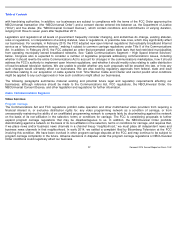 22
22 -
 23
23 -
 24
24 -
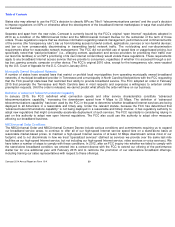 25
25 -
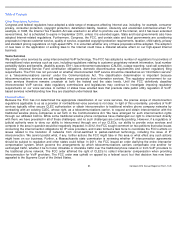 26
26 -
 27
27 -
 28
28 -
 29
29 -
 30
30 -
 31
31 -
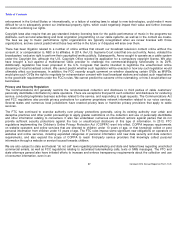 32
32 -
 33
33 -
 34
34 -
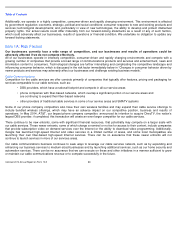 35
35 -
 36
36 -
 37
37 -
 38
38 -
 39
39 -
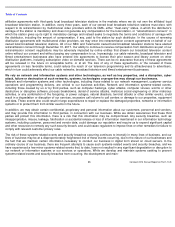 40
40 -
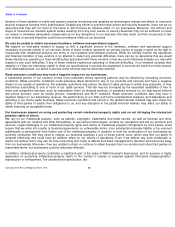 41
41 -
 42
42 -
 43
43 -
 44
44 -
 45
45 -
 46
46 -
 47
47 -
 48
48 -
 49
49 -
 50
50 -
 51
51 -
 52
52 -
 53
53 -
 54
54 -
 55
55 -
 56
56 -
 57
57 -
 58
58 -
 59
59 -
 60
60 -
 61
61 -
 62
62 -
 63
63 -
 64
64 -
 65
65 -
 66
66 -
 67
67 -
 68
68 -
 69
69 -
 70
70 -
 71
71 -
 72
72 -
 73
73 -
 74
74 -
 75
75 -
 76
76 -
 77
77 -
 78
78 -
 79
79 -
 80
80 -
 81
81 -
 82
82 -
 83
83 -
 84
84 -
 85
85 -
 86
86 -
 87
87 -
 88
88 -
 89
89 -
 90
90 -
 91
91 -
 92
92 -
 93
93 -
 94
94 -
 95
95 -
 96
96 -
 97
97 -
 98
98 -
 99
99 -
 100
100 -
 101
101 -
 102
102 -
 103
103 -
 104
104 -
 105
105 -
 106
106 -
 107
107 -
 108
108 -
 109
109 -
 110
110 -
 111
111 -
 112
112 -
 113
113 -
 114
114 -
 115
115 -
 116
116 -
 117
117 -
 118
118 -
 119
119 -
 120
120 -
 121
121 -
 122
122 -
 123
123 -
 124
124 -
 125
125 -
 126
126 -
 127
127 -
 128
128 -
 129
129 -
 130
130 -
 131
131 -
 132
132 -
 133
133 -
 134
134 -
 135
135 -
 136
136 -
 137
137 -
 138
138 -
 139
139 -
 140
140 -
 141
141 -
 142
142 -
 143
143 -
 144
144 -
 145
145 -
 146
146 -
 147
147 -
 148
148 -
 149
149 -
 150
150 -
 151
151 -
 152
152 -
 153
153 -
 154
154 -
 155
155 -
 156
156 -
 157
157 -
 158
158 -
 159
159 -
 160
160 -
 161
161 -
 162
162 -
 163
163 -
 164
164 -
 165
165 -
 166
166 -
 167
167 -
 168
168 -
 169
169 -
 170
170 -
 171
171 -
 172
172 -
 173
173 -
 174
174 -
 175
175 -
 176
176 -
 177
177 -
 178
178 -
 179
179 -
 180
180 -
 181
181 -
 182
182 -
 183
183 -
 184
184 -
 185
185 -
 186
186 -
 187
187 -
 188
188 -
 189
189 -
 190
190 -
 191
191 -
 192
192 -
 193
193 -
 194
194 -
 195
195 -
 196
196 -
 197
197 -
 198
198 -
 199
199 -
 200
200 -
 201
201 -
 202
202 -
 203
203 -
 204
204 -
 205
205 -
 206
206 -
 207
207 -
 208
208 -
 209
209 -
 210
210 -
 211
211 -
 212
212 -
 213
213 -
 214
214 -
 215
215 -
 216
216 -
 217
217 -
 218
218 -
 219
219 -
 220
220 -
 221
221 -
 222
222 -
 223
223 -
 224
224 -
 225
225 -
 226
226 -
 227
227 -
 228
228 -
 229
229 -
 230
230 -
 231
231 -
 232
232 -
 233
233 -
 234
234 -
 235
235 -
 236
236 -
 237
237 -
 238
238 -
 239
239 -
 240
240 -
 241
241 -
 242
242 -
 243
243 -
 244
244 -
 245
245 -
 246
246 -
 247
247 -
 248
248 -
 249
249 -
 250
250 -
 251
251 -
 252
252 -
 253
253 -
 254
254 -
 255
255 -
 256
256 -
 257
257 -
 258
258 -
 259
259 -
 260
260 -
 261
261 -
 262
262 -
 263
263 -
 264
264 -
 265
265 -
 266
266 -
 267
267 -
 268
268 -
 269
269 -
 270
270 -
 271
271 -
 272
272 -
 273
273 -
 274
274 -
 275
275 -
 276
276 -
 277
277 -
 278
278 -
 279
279 -
 280
280 -
 281
281 -
 282
282 -
 283
283 -
 284
284 -
 285
285 -
 286
286 -
 287
287 -
 288
288 -
 289
289 -
 290
290 -
 291
291 -
 292
292 -
 293
293 -
 294
294 -
 295
295 -
 296
296 -
 297
297 -
 298
298 -
 299
299 -
 300
300 -
 301
301 -
 302
302 -
 303
303 -
 304
304 -
 305
305 -
 306
306 -
 307
307 -
 308
308 -
 309
309 -
 310
310 -
 311
311 -
 312
312 -
 313
313 -
 314
314 -
 315
315 -
 316
316 -
 317
317 -
 318
318 -
 319
319 -
 320
320 -
 321
321 -
 322
322 -
 323
323 -
 324
324 -
 325
325 -
 326
326 -
 327
327 -
 328
328 -
 329
329 -
 330
330 -
 331
331 -
 332
332 -
 333
333 -
 334
334 -
 335
335 -
 336
336 -
 337
337 -
 338
338 -
 339
339 -
 340
340 -
 341
341 -
 342
342 -
 343
343 -
 344
344 -
 345
345 -
 346
346 -
 347
347 -
 348
348 -
 349
349 -
 350
350 -
 351
351 -
 352
352 -
 353
353 -
 354
354 -
 355
355 -
 356
356 -
 357
357 -
 358
358 -
 359
359 -
 360
360 -
 361
361 -
 362
362 -
 363
363 -
 364
364 -
 365
365 -
 366
366 -
 367
367 -
 368
368 -
 369
369 -
 370
370 -
 371
371 -
 372
372 -
 373
373 -
 374
374 -
 375
375 -
 376
376 -
 377
377 -
 378
378 -
 379
379 -
 380
380 -
 381
381 -
 382
382 -
 383
383 -
 384
384 -
 385
385 -
 386
386
 |
 |

Table of Contents
enforcement in the United States or internationally, or a failure of existing laws to adapt to new technologies, could make it more
difficult for us to adequately protect our intellectual property rights, which could negatively impact their value and further increase
the costs of enforcing our rights.
Copyright laws also require that we pay standard industry licensing fees for the public performance of music in the programs we
distribute, such as local advertising and local origination programming on our cable systems, as well as in the content we create.
The fees we pay to music performance rights organizations are typically renegotiated when we renew licenses with those
organizations, and we cannot predict what those fees will be in the future or if disputes will arise over them.
There has been litigation related to a number of online entities that stream our broadcast television content online without the
consent of, or compensation to, NBC or its affiliates. In 2014, the U.S. Supreme Court ruled that one such entity, Aereo, violated the
broadcasters’
exclusive right to perform their copyrighted works publicly. Subsequently, Aereo sought to operate as a cable system
under the Copyright Act, although the U.S. Copyright Office rejected its application for a compulsory copyright license. We also
have brought a suit against a multichannel video provider to challenge the commercial-
skipping functionality in its DVR.
Additionally, legislation has been proposed in the U.S. Congress that seems intended to legitimize the unauthorized online
streaming of local broadcast content. We cannot predict whether such legislation will be enacted or how any such legislation would
ultimately affect our businesses. In addition, the FCC recently sought comment on whether classifying certain OVDs as MVPDs
would give such OVDs the right to negotiate for retransmission consent with local broadcast stations and subject such negotiations
to the good-faith requirements under the FCC’
s rules. We cannot predict the outcome of the rulemaking, or how it would affect our
businesses.
Privacy and Security Regulation
The Communications Act generally restricts the nonconsensual collection and disclosure to third parties of cable customers’
personally identifiable information by cable operators. There are exceptions that permit such collection and disclosure for rendering
service, conducting legitimate business activities related to the service, and responding to legal requests. The Communications Act
and FCC regulations also provide privacy protections for customer proprietary network information related to our voice services.
Several states and numerous local jurisdictions have enacted privacy laws or franchise privacy provisions that apply to cable
services.
The FTC has continued to exercise authority over privacy protections generally, using its existing authority over unfair and
deceptive practices and other public proceedings to apply greater restrictions on the collection and use of personally identifiable
and other information relating to consumers. It also has undertaken numerous enforcement actions against parties that do not
provide sufficient security protections against the loss or unauthorized disclosure of this type of information. In 2013, FTC
regulations implementing the Children’s Online Privacy Protection Act (“COPPA”)
went into effect. COPPA imposes requirements
on website operators and online services that are directed to children under 13 years of age, or that knowingly collect or post
personal information from children under 13 years of age. The FTC rules impose some significant new obligations on operators of
websites and online services, including expanded categories of personal information and new data security and data retention
requirements, and also expand the scope of COPPA to reach third-
party service providers that knowingly collect personal
information through a website or service focused towards children.
We are also subject to state and federal “do not call”
laws regarding telemarketing and state and federal laws regarding unsolicited
commercial emails, as well as FCC regulations relating to automated telemarketing calls, texts or SMS messages. The FTC and
state attorneys general also have initiated efforts to increase and enforce transparency requirements about the collection and use
of consumer information, even in an
27
Comcast 2014 Annual Report on Form 10
-
K
